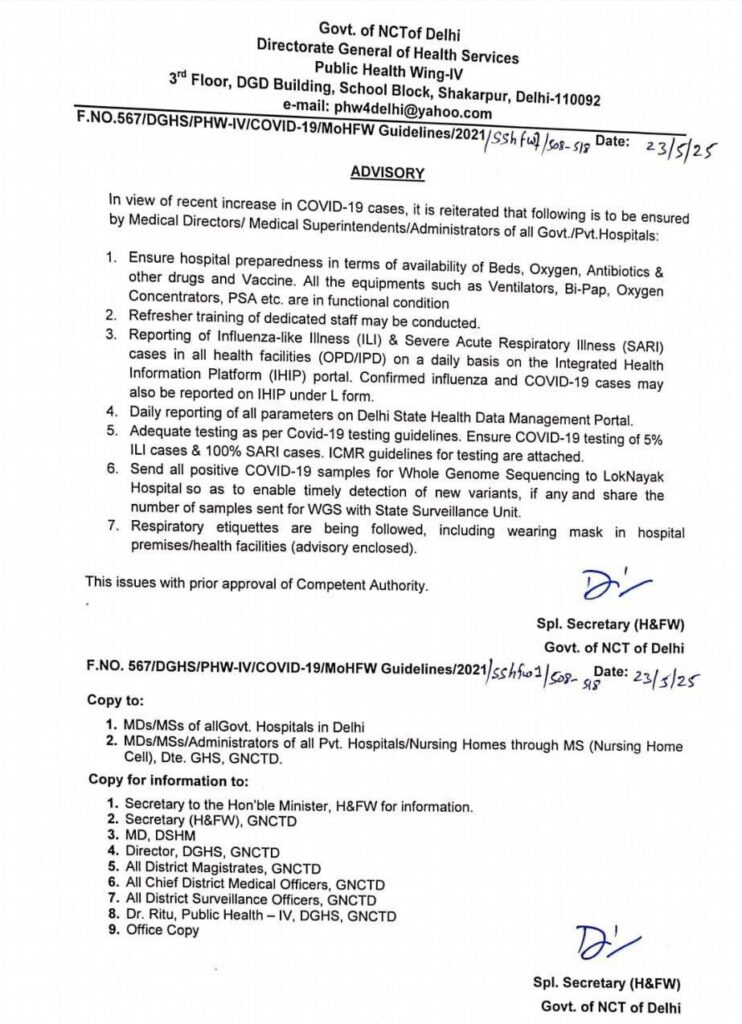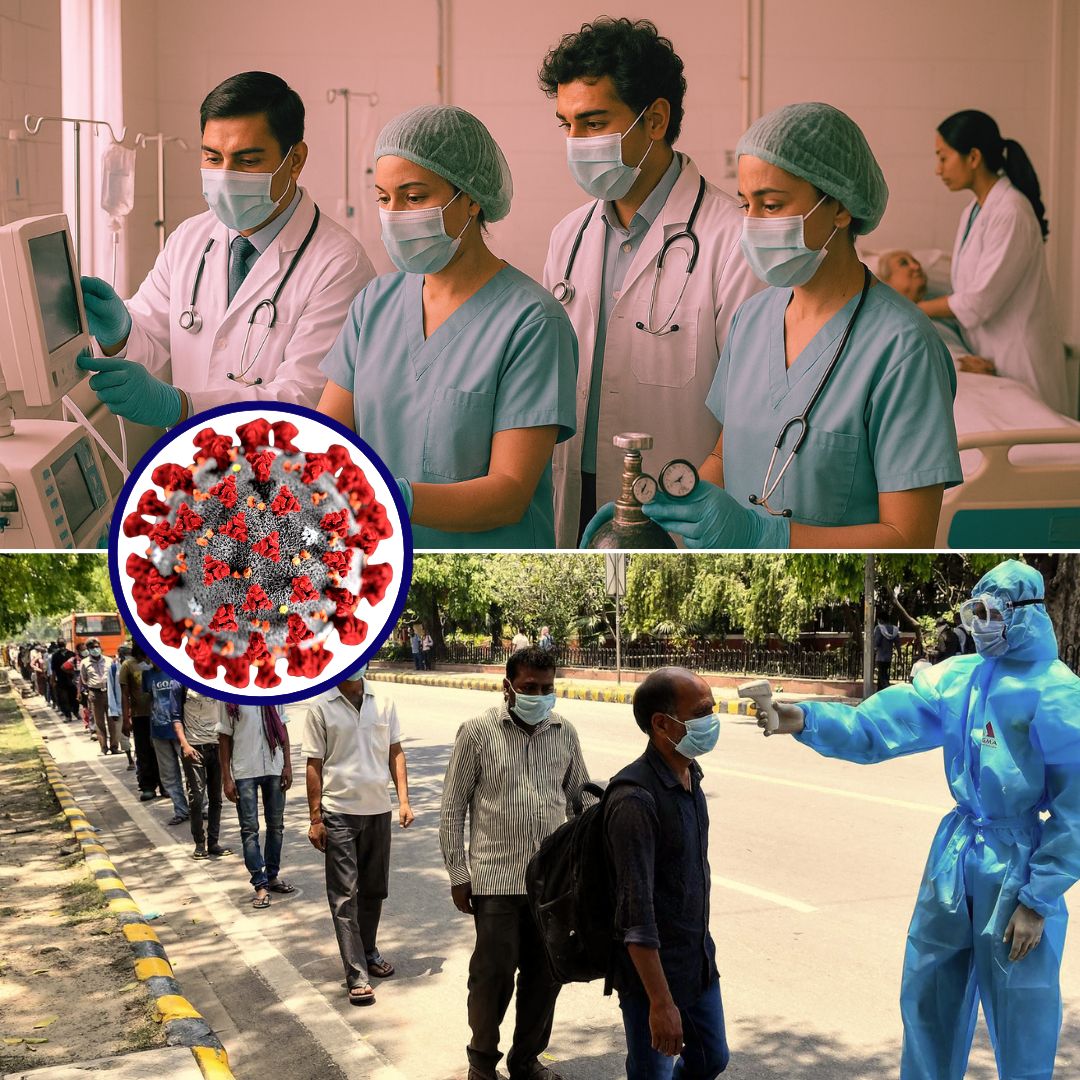Between early and mid-May 2025, India has witnessed a gradual but notable rise in Covid-19 cases, prompting key states like Delhi and Maharashtra to issue advisories on May 23, urging hospitals and health centres to enhance preparedness.
As of May 19, the Union Health Ministry reported 257 active cases nationwide, with Kerala, Maharashtra, Tamil Nadu, and Delhi accounting for the majority.
While most infections remain mild and manageable, officials across states have emphasised the importance of maintaining Covid-appropriate behaviour, especially among vulnerable groups, as new Omicron subvariants circulate domestically and internationally.
Rising Cases Prompt Urgent Health Advisories Across States
The resurgence of Covid-19 cases in India became evident in early May, with Kerala reporting a sharp increase from May 12 onwards. By May 19, Kerala had recorded 69 new cases within a week, pushing its active caseload to 95. Maharashtra followed closely, with 44 new cases between May 12 and May 19, including 16 hospitalisations in Mumbai alone.
On May 23, the Brihanmumbai Municipal Corporation (BMC) confirmed that while two recent Covid-positive deaths occurred, both patients had significant pre-existing conditions, and Covid was not the direct cause. Delhi, which had maintained low case numbers for months, reported 23 new cases in the past ten days, prompting Health Minister Pankaj Kumar Singh to issue a statement assuring citizens that all patients are stable and under observation.
Karnataka’s Health Minister Dinesh Gundu Rao reported 35 active cases as of May 22, including a nine-month-old infant in Bengaluru who is stable and receiving care. These developments have led the Delhi and Maharashtra governments to issue formal advisories on May 23, directing hospitals to ensure the availability of beds, oxygen, vaccines, and essential medicines, and to maintain the proper functioning of critical equipment such as ventilators, oxygen concentrators, Bi-PAP machines, and PSA plants.

Expert Guidance: Mild Cases, Vigilance Over Panic
Health experts unanimously agree that the current uptick does not indicate a surge but rather sporadic, mild cases. Dr Suranjit Chatterjee, Senior Consultant in Internal Medicine at Indraprastha Apollo Hospital, stated on May 23, “At the moment, the situation is under control. There are, at most, sporadic cases, which are rare. Even the present cases are being managed very easily.
There is no panic; this is what we had expected — COVID-19 behaving like a seasonal flu.” He added that no hospitalisations or ICU admissions related to Covid-19 have been reported, and cautioned against unnecessary hype. Dr Divaya K S, Consultant Infectious Disease Specialist at Apollo Hospitals, explained that the rise is consistent with global trends as the virus becomes endemic: “Periodic surges in COVID-19 cases are considered to be normal as the virus becomes endemic.
The majority of these cases are mild… this can still be considered a small spike and does not warrant panic”. Dhiren Gupta, Co-Director of the Paediatric ICU at Sir Gangaram Hospital, noted that while some respiratory symptoms are being seen, severity is minimal and primarily affects babies under one year, as seen during the Omicron wave.
Strengthened Precautions and Public Health Messaging
In response to the rising numbers, health departments across affected states have intensified public advisories. Kerala’s Health Minister Veena George urged citizens on May 21 to remain vigilant, especially as Omicron subvariants LF.7 and NB.1.8—also responsible for recent surges in Singapore and Hong Kong—spread in the region.
She emphasised the need for mandatory masking in hospitals and encouraged people to avoid crowded places. Andhra Pradesh’s health department issued a public advisory on May 22, urging the avoidance of mass gatherings and recommending that elderly persons, pregnant women, and those with co-morbidities stay indoors where possible.
The Union Health Ministry has also called for increased testing, particularly among patients with influenza-like illness (ILI) and severe acute respiratory infections (SARI), and has restarted genome sequencing efforts to track variant evolution. Across states, officials consistently stress the importance of mask-wearing, hand hygiene, and maintaining social distancing in crowded settings to curb transmission.
Context and Ongoing Vigilance Amid Mild Cases
Despite the uptick, experts and authorities highlight that the current wave remains mild, with most cases presenting flu-like symptoms such as low-grade fever, sore throat, cough, and fatigue. As of May 19, India’s total active Covid-19 caseload stood at 257, a minuscule fraction compared to previous waves.
The majority of patients are recovering at home, with very few requiring hospitalisation. The country’s robust vaccination coverage—with over 2.2 billion doses administered—continues to provide a critical shield against severe disease and death.
The Brihanmumbai Municipal Corporation clarified on May 23 that recent Covid-positive deaths were due to underlying health conditions rather than the virus itself, underscoring the mild nature of current infections. Nationally, India has recorded over 45 million Covid-19 cases and more than 533,000 deaths since the pandemic began, but the health system remains vigilant, ready to respond swiftly to any escalation.
The Logical Indian’s Perspective
The recent rise in Covid-19 cases serves as a timely reminder that the pandemic is not yet behind us, even as normalcy returns to daily life. The proactive advisories and clear communication from health authorities reflect a responsible, community-centred approach that balances caution with optimism.
At this juncture, it is vital that we foster empathy towards vulnerable populations, support healthcare workers tirelessly managing the situation, and uphold Covid-appropriate behaviour without succumbing to fear or complacency.
As we navigate this evolving phase, how can we collectively ensure that our vigilance and compassion translate into sustained resilience and a healthier society for all?











